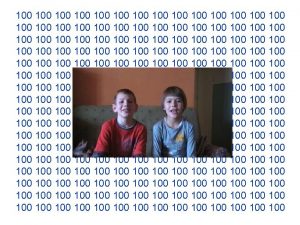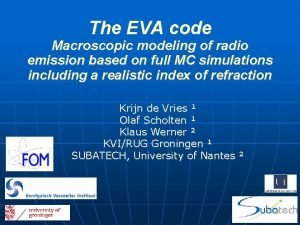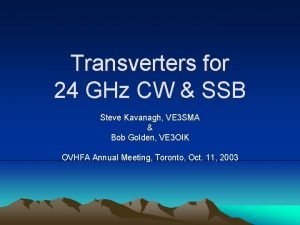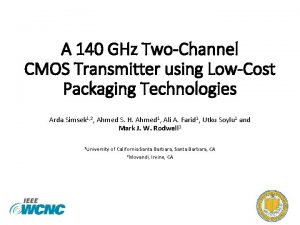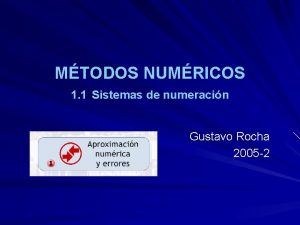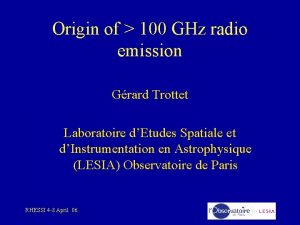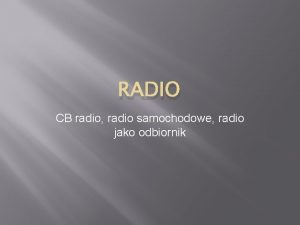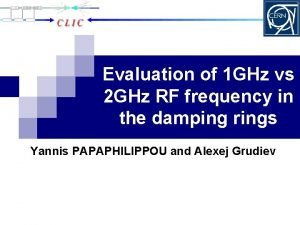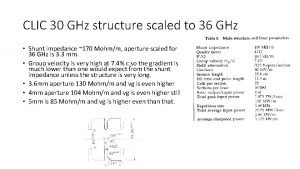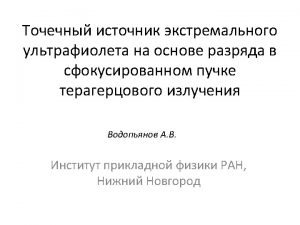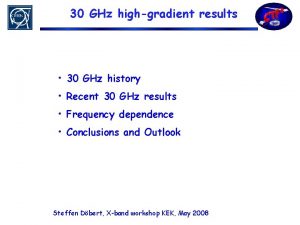Origin of 100 GHz radio emission Grard Trottet












- Slides: 12

Origin of > 100 GHz radio emission Gérard Trottet Laboratoire d’Etudes Spatiale et d’Instrumentation en Astrophysique (LESIA) Observatoire de Paris RHESSI 4 -8 April 06

First observations of solar flares at ≤ 1 mm (SST) • X and cm- : typical impulsive flare impulsive • 202 GHz (SST): HF of the synchrotron spectrum = HE part of the e- spectrum 2 ce ( HF spectrum= measure of the extent of the e- energy spectrum) • time-extended phase (thermal ? ) RHESSI 4 -8 April 06 Trottet et al. 2002 A&A

RHESSI 4 -8 April 06

Trottet et al. 1998 Vilmer et al. 1999 Spectral index > 1 Me. V: ~1. 5 - 2. 2 with <1. 9> No longitude effect Rieger et al. 1998 RHESSI 4 -8 April 06

Trottet et al. 1998 Peak c from HXR/GR = 4. 1 for E<Eb = 1. 5 for E>Eb -observed = 1. 5 Peak d - from HXR/GR = 2. 7 for E<Eb = 1. 2 for E>Eb -observed = 1. 3 Peak a = 1. 5 RHESSI 4 -8 April 06

> 0. 4 -1 Me. V GR continuum and cm-mm radio emission produced by the same population of relativistic e- (e. g. Trottet et al. 1998, 2000). Radio is thus a sensitive diagnostic of relativistic e-: - relativistic electrons are produced even in small flares (BIMA, Kundu et al. ) - consistent with production of relativistic electrons since the very beginning of a flare sub-second time structures correlated HXR atand mm wavelengths: fast acceleration of both non relativistic an relativistic e- (Kaufmann et al. 2000) HOWEVER ! RHESSI 4 -8 April 06

2003 Nov 4 gs RHESSI 4 -8 April 06

Gs+term (corona) up to ≈ 200 GHz but increasing spect. at higher freq. ? 2003 Oct 28 Gs spectr. 345 GHz Impulsive burst B at 210 starts when the > 10 Me. V GR spectrum hardens Above 210 GHz The radio spectrum Increases with freq. Trottet et al. 2005 RHESSI 4 -8 April 06 Luethi et al. 2004 A&A

Increasing spectra above 200 GHz ? • Optically thick gs. From e- compact and very dense sources with high magnetic field: unrealistic numbers of high energy electrons! • gs. from positrons (Lingenfelter & Ramaty 1967) • Inverse Compton/gs (Kaufmann et al. 1986) • Thermal: optically thick free-free emission: energy deposition in the chromosphere by particles or conduction fronts RHESSI 4 -8 April 06

Trottet et al. 2006 2003 0 ctober 28 RHESSI 4 -8 April 06

Example of gs from positrons (Lingenfelter & Ramaty 1967) SST 200 Me. V RHESSI 4 -8 April 06 50 Me. V TIR B=400 G B

Microwaves: gyro-synch. emis, non thermal e- SMESE RHESSI 4 -8 April 06
